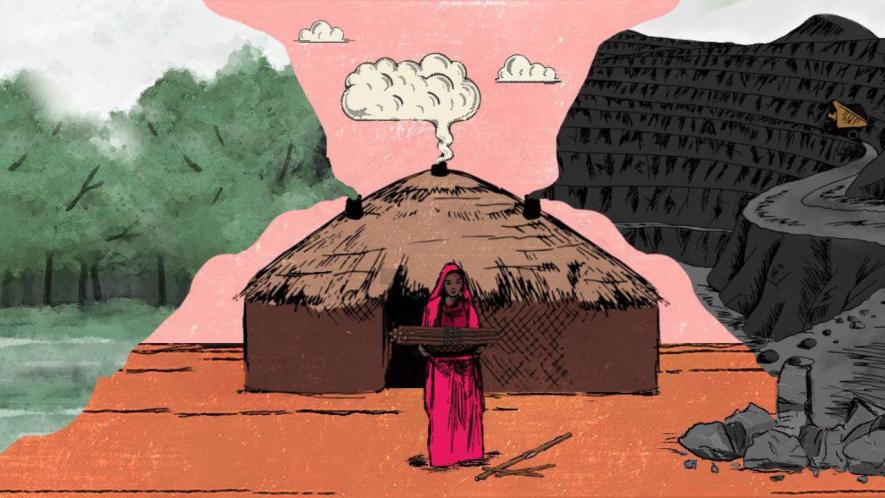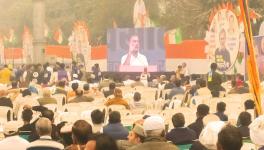How Concerned Are National Parties on Land, Forest Rights for Adivasis?

Image : Rubin D'Souza / Scroll
Sabrang India takes a closer look at some of the regions where tribal communities have been rallying for their rights and examines if the electoral campaign raised these issues. Hindutva, which remains BJP’s core ideology, has alienated Adivasi (tribal/indigenous peoples’) communities as it seeks to bulldoze their unique identity and histories. An aspect which is their core symbol and provides for their voter base could very well have them lose India’s indigenous tribes as voters.
An example of this is seen from Maharashtra where Janjati Suraksha Manch, a group backed by the BJP’s ideological parents, the Rashtriya Swayamsevak Sangh (RSS) raised alarm after it demanded delisting religious converts from being recognised as scheduled tribes. Even Adivasi leaders from within BJP were alarmed at the demand, according to the report by Hindustan Times, and expressed fear that such demands and assertions would make the BJP lose vote in the upcoming elections. Similarly, tribes across India have been resisting Sanskritisation (read Hinduisation).
Out of the 48 Lok Sabha seats in Maharashtra, four are reserved for tribal communities. These seats include Nandurbar, Dindori, Gadchiroli-Chimur, and Palghar. Maharashtra’s Ramtek, Nagpur, Bhandara-Gondiya, Gadchiroli-Chimur, Chandrapur go to poll this coming week. With the main national players’, BJP and Congress, manifesto yet to be released, both parties have made appeals to Adivasis in Maharashtra. The Indian National Congress (INC) has, however released the Adivasi Sankalp, a programme within the manifesto especially for forest dwellers and Adivasis, on March 13. On March 15, Congress; Rahul Gandhi visited Nandurbar, and accused the BJP-led government of stripping tribals of their rights to the water, forest, and land, ‘jal, jangal, zameen’, as reported widely in the media. He promised that under his government, any district in India with a tribal population exceeding 50% would be included into the Sixth Schedule of the Constitution and also vowed to conduct a caste census and an economic survey of the population.
The Video of his speech may be watched here:
Conversely in November, 2023, the Indian Express had reported that the BJP was ‘reaching out’ to the Vimukta Jati and Nomadic tribes through the festival of Diwali. Unlike the language of land and rights over forest produce (means of production), the Sangh and its parliamentary wings has always chosen the culturally assimilative route. State BJP president Chandrashekhar Bawankule had then stated, “We have an emotional connection with the VJNT communities. We want to associate with them and ensure their participation in the festival of lights. We endeavour to bring joy to their ghettos.”
Similarly, Chhattisgarh’s Bastar also goes to poll in the upcoming weeks. Bastar has seen constant attempts at polarisation in the recent times as attacks against Christians have increased. The region has a significant population of Christians, several of whom belong to Scheduled Tribes, who have been facing attacks by local Hindutva leaders of the past year and more. Bastar has seen the BJP win in 2014, but lost to the Congress in 2019 elections. In the recent state elections, however the region swung back to the BJP.
On the national level, PM Modi recently launched the Janjatiya Gaurav Divas in Jharkhand in November 2023. The scheme had been initially announced in the 2023-24 Budget and is a part of the government’s Particularly Vulnerable Tribal Groups Development. The programme aims to provide basic facilities like housing, clean water, education, healthcare, roads, and livelihood opportunities. The PM’s visit to Jharkhand in December 2023, saw protestors demanding the institution of the Sarna Dharma Code as a separate religion; many of these protestors were arrested. However, introduction of schemes for Adivasis does not always mean their implementation as another scheme introduced by the government in the 2022-23 budget called the Venture Capital Fund for Scheduled Tribes (VCF-ST) was reportedly not put into action even after two years since its announcement, according to The Print. Much of this puts the BJP’s hold on Adivasi trust in a sticklish position.
Conversely the opposition paints a different narrative. On March 13, senior Congress leader Kharge revealed the party’s Adivasi programme manifesto, called the Adivasi Sankalp which has laid out six guarantees for the community, one of which included doing away with the much criticised amendments made by the BJP government to Forest Conservation Amendment Act (2023). The plan by the party has emphasised on the protection of Adivasi sources of livelihood and access to their land, water, and forest.
Get the latest reports & analysis with people's perspective on Protests, movements & deep analytical videos, discussions of the current affairs in your Telegram app. Subscribe to NewsClick's Telegram channel & get Real-Time updates on stories, as they get published on our website.
























